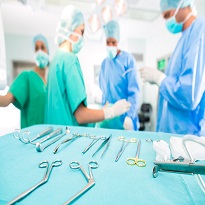
Each year, over one million people in America undergo surgery to correct a hernia. The first laparoscopic hernia surgery took place in 1979 but physicians noted that recurrence was a common problem. The medical device known as hernia mesh was developed to solve this problem, and was introduced in 1989. Use of the medical device continues to grow, though it is not recommended for every hernia surgery.
The most common form of hernia is the inguinal, which occurs in the inner groin. This accounts for 80 percent of hernias operated on in the United States. The remaining hernias are femoral, incisional, ventral, umbilical, and hiatal. Hiatal is one of the most widely-known forms of hernia because it affects the abdomen or upper stomach, causing a bulge which is readily seen. The cause of all hernias is the same. Pressure forces a weakness in connective tissue or muscles which then permits parts of the body to protrude, causing pain and discomfort.
The hernia may or may not be serious depending on what is forced out of place and where. The treating physician may recommend a non-surgical or surgical remedy and discuss the kind of surgery deemed best. Open repair surgery requires an invasive cut to permit the surgeon access to the hernia within so that repairs may be made. Laparoscopic surgery is a less-invasive technique where several small incisions are made near the hernia which permit tools to be inserted for corrective procedures. In either case, the operating surgeon may choose to use surgical mesh.
Surgical mesh is developed from animal skins or intestines, generally cows or pigs, or from synthetic materials. Some is absorbable by the body and used to strengthen tissue until the body can repair the damage. Non-absorbable mesh is designed to remain in the body as a permanent prosthetic implant.
Complications of hernia surgery with or without the use of surgical mesh may include pain, recurrence, adhesion, infection, and bowel obstruction. However, surgical mesh may cause additional problems as it has been known to contract or migrate. Obstruction and perforation commonly occur with the use of faulty surgical mesh devices.
The Food and Drug Administration studied common side effects of surgical mesh and concluded that in most cases, obstruction and perforation was caused by counterfeit or recalled products. In 2010, the agency discovered that counterfeit devices were being sold under the C. R. Bard/Davol name. The counterfeit Bard Flat Mesh or Marlex mesh had been distributed in four sizes and even included Bard product numbers. Another key issue with the counterfeit hernia surgical mesh is lack of sterility that may cause infections in recipients. Hospitals and surgeons were informed of the crime and how to spot the counterfeit products. At least one distributor initiated a voluntary recall of the defective medical devices.
Whether a person has undergone hernia surgery and received a counterfeit medical device or any other, if needless complications have occurred, these should be investigated. If a faulty medical device is the reason, those responsible should be held to task. The Philadelphia medical product liability lawyers at Brookman, Rosenberg, Brown & Sandler can help. From our Center City Philadelphia offices, we help clients from Delaware County, Chester County, Philadelphia County and throughout Pennsylvania and New Jersey. To arrange a free consultation, contact us online or call now 800-369-0899.